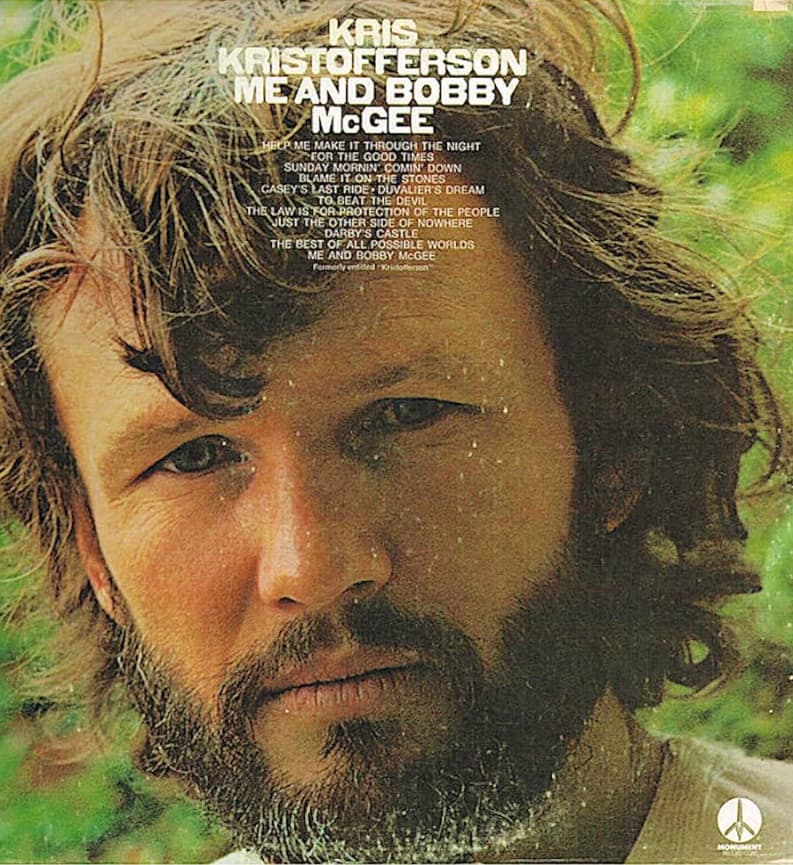
Kris Kristofferson – The Soulful Journey of “Me and Bobby McGee”
Few songs have left as deep an imprint on the American musical landscape as Kris Kristofferson’s “Me and Bobby McGee.” First released in 1969 and later made iconic by Janis Joplin in 1971, this timeless classic captures the spirit of freedom, love, and loss in a way that resonates with listeners across generations. Written by Kristofferson and Fred Foster, “Me and Bobby McGee” is more than just a tale of love on the open road—it’s a meditation on the bittersweet nature of life itself.
At the heart of the song is a narrative about two drifters, the speaker and Bobby McGee, who experience fleeting moments of love and companionship as they travel together, only to eventually part ways. The song’s most famous lyric, “Freedom’s just another word for nothin’ left to lose,” has become a defining statement on the complexity of freedom. It captures the paradox that while being untethered brings liberation, it also comes with a sense of emptiness and loss. This line, perhaps more than any other, cements “Me and Bobby McGee” as a song that speaks to the dualities of life: joy and sorrow, love and separation, freedom and loneliness.
Musically, the song’s simplicity belies its emotional depth. Kristofferson’s original version, a laid-back blend of country and folk, allows the lyrics to take center stage. The gentle guitar strumming and understated arrangement create a sense of intimacy, making it feel like the listener is being invited into a personal moment of reflection. Kristofferson’s gruff, sincere vocals add a layer of authenticity to the story, giving the impression that these aren’t just lyrics, but lived experiences.
While the song was first performed by Roger Miller in 1969, it was Janis Joplin’s passionate rendition in 1971 that propelled “Me and Bobby McGee” into legendary status. Joplin’s version, released posthumously just days after her tragic death, took the song to number one on the Billboard Hot 100, giving it a rock and blues infusion that brought out the raw emotion in Kristofferson’s lyrics. Her soulful, gravelly voice transformed the song into an anthem of heartbreak and longing, and her delivery of the famous line about freedom still sends chills down the spine of anyone who hears it.
But beyond the vocals, the true beauty of “Me and Bobby McGee” lies in its storytelling. The song paints vivid scenes: two lovers hitching rides, sharing songs, and making memories along the highways and byways of America. There’s a sense of adventure, of living in the moment, that is palpable throughout the song. Yet, as the narrative unfolds, there’s an underlying melancholy that hints at the inevitability of their separation. As they go their separate ways, the speaker is left with only the memories of their time together, bittersweet reminders of what was and what will never be again.
The song’s structure, shifting between joyful recollections and moments of regret, mirrors the emotional journey of the speaker. The chorus, which starts as a celebration of their love and freedom, becomes a lament for what has been lost. By the time the song reaches its final verse, the listener is left with a lingering sense of sadness, as the speaker realizes that despite the beauty of their time together, Bobby is now just a memory.
What makes “Me and Bobby McGee” so powerful is that it’s a song many can relate to. We’ve all had moments of fleeting happiness, relationships that burn bright for a while but eventually fade away. And like the speaker in the song, we’re left with the memories—both beautiful and painful—that continue to shape us long after the relationship has ended. It’s this universality that has kept the song relevant over the decades, allowing it to be covered by artists from a wide range of genres, from country to rock to blues.
In Kristofferson’s version, there’s a certain resignation in his voice, an understanding that life is full of these moments of impermanence. His performance isn’t full of regret, but rather a quiet acceptance that freedom, love, and loss are all part of the same journey. His delivery of the song feels like a conversation, a late-night confession to a friend, about a chapter in his life that has come to an end but will never be forgotten.
Musically, “Me and Bobby McGee” has an easy-going, rambling feel that perfectly complements the lyrics. The gentle guitar picking and country-inflected melody evoke the vast American landscapes the speaker and Bobby traveled together. It’s music for the open road, for long stretches of highway where the only companions are the wind, the sky, and the memories of lost love.
In the years since its release, “Me and Bobby McGee” has become one of the most covered and celebrated songs in American music history. Whether performed by Kris Kristofferson, Janis Joplin, or countless other artists, the song continues to resonate with audiences because of its timeless themes and honest portrayal of human emotion. The combination of freedom, love, and heartache is one that speaks to the human experience in all its complexity.
In conclusion, Kris Kristofferson’s “Me and Bobby McGee” is more than just a classic country song—it’s a poignant exploration of love, freedom, and the transient nature of life. With its unforgettable lyrics, simple yet evocative melody, and Kristofferson’s soulful delivery, the song has earned its place as one of the most beloved and enduring tracks of its era. Whether you listen to Kristofferson’s original or Joplin’s fiery interpretation, “Me and Bobby McGee” will always remain a song that touches the heart and stirs the soul.